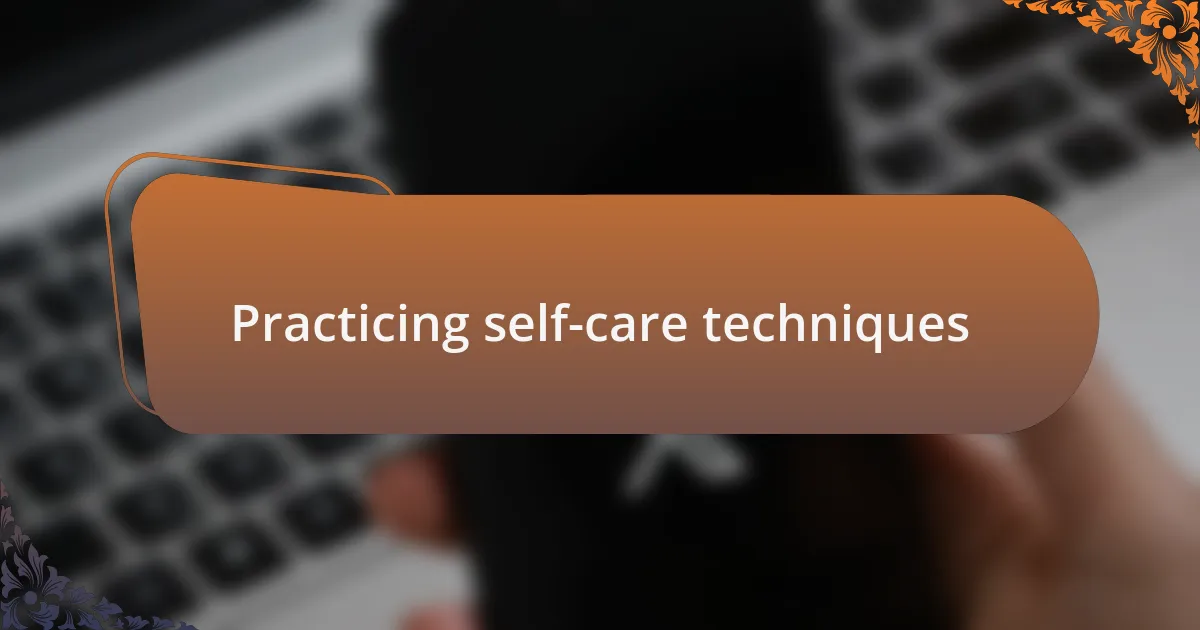Key takeaways:
- Selective mutism is a complex anxiety disorder characterized by a child’s inability to speak in certain social situations, despite being able to communicate comfortably at home.
- Building motivation through small, achievable goals and celebrating minor victories is crucial in helping children overcome challenges associated with selective mutism.
- Identifying personal challenges and practicing self-care techniques can foster understanding and resilience, paving the way for personal growth.
- Creating a supportive network is essential for those dealing with selective mutism, as connections with empathetic individuals can provide encouragement and validation.

Understanding selective mutism
Selective mutism is a complex childhood anxiety disorder that prevents a child from speaking in certain situations, despite having the ability to communicate verbally in comfortable settings, like at home. I often wonder how isolating it must feel for a child who can express themselves freely at home yet feels trapped in silence at school or social gatherings. It’s heartbreaking to think about how these children navigate their worlds, with thoughts and feelings bubbling up inside, but unable to share them with others.
From my experience, witnessing a child struggle with selective mutism is both eye-opening and emotional. Imagine being in a room full of peers, wanting desperately to join the conversation, yet feeling completely paralyzed by anxiety. It often goes beyond just shyness; it’s an overwhelming fear that can stem from various factors, like past experiences or a heightened sensitivity to social interactions. I remember a moment when a child finally mustered the courage to speak—seeing their relief was incredibly moving.
It’s essential for us to understand that selective mutism isn’t a choice; rather, it’s a coping mechanism for anxiety. I often reflect on how important it is for parents, educators, and friends to create a supportive environment. How can we foster connections that allow these children to feel safe enough to express themselves? I believe that with patience and understanding, we can help bridge that gap, encouraging them to find their voice in a world that often feels too daunting to navigate.

Importance of motivation in challenges
Motivation plays a crucial role when facing challenges, especially for children dealing with selective mutism. I recall the moment when a young student I worked with finally found the bravery to express a single word in class. That breakthrough didn’t just emerge from the child’s newfound courage; it stemmed from a consistent environment where motivation was nurtured. It made me realize how powerful encouragement can be in helping individuals push through their fears.
Without motivation, challenges can feel insurmountable. I often think about the significance of small victories—how each little accomplishment can serve as a motivation booster. For instance, when a child who usually stays silent engages in a brief conversation with a friend, that achievement becomes a stepping stone, fostering the confidence they need to tackle bigger challenges ahead.
I have seen firsthand how motivation can transform a seemingly hopeless situation. When a supportive adult celebrates even the tiniest effort, it sends a message: you are capable. This support is essential in building resilience. But I ask you, how often do we take a moment to recognize and appreciate these steps? It’s vital for those supporting children with selective mutism to remember that motivation isn’t just about big leaps—it’s about the small steps that lead to monumental change.

Identifying personal challenges
Identifying personal challenges is a vital first step in overcoming them. I remember sitting down with a child who struggled to speak in social situations. By simply asking open-ended questions about their feelings, we uncovered fears linked to previous experiences. This process of exploration not only highlighted their personal challenges but also opened a dialogue that nurtured trust between us.
It’s interesting to note how often we overlook the subtleties of our own challenges. Reflecting on my experience, I’ve noticed that recognizing what truly scares us can feel daunting. For instance, when I finally acknowledged my own anxiety around public speaking, it became easier to address. This revelation wasn’t immediate; it took time and self-reflection to understand that avoiding situations where I’d need to speak was actually hindering my growth.
Sometimes, the hardest part is simply naming these challenges. I recall a moment with a parent who was hesitant to admit their child’s struggles stemmed from anxiety rather than lack of interest. This realization was an emotional turning point; it reminded me that acknowledgment is half the battle. So, what personal challenges have you identified? Recognizing them can lead to transformative change, fostering a path toward connection and understanding.

Setting achievable goals for success
Setting achievable goals is a cornerstone for success in any endeavor. I once worked with a young girl who wanted to join a school play but felt overwhelmed by the idea of performing. Instead of focusing on the final goal of standing on stage, we broke it down: her first step was simply to memorize a line, followed by practicing it in front of a mirror. This step-by-step approach empowered her to see progress, making the ultimate goal seem more attainable.
Reflecting on my own journey, I remember setting a goal to deliver a community workshop. Initially, the thought was intimidating, and the fear of failure loomed large. However, I decided to start small by creating an outline and practicing with friends. Each milestone reached brought a sense of accomplishment, transforming my fear into motivation. Have you ever experienced a goal that felt insurmountable but became manageable through smaller steps?
When working with individuals facing selective mutism, I’ve found that establishing realistic goals can significantly boost confidence. I often encourage parents to set daily goals, such as initiating a conversation with a peer or speaking a word in class. These small victories build a foundation of self-assurance, demonstrating that success is a journey comprised of many tiny, achievable steps. How do you envision your path to success, and what small steps can you take today?

Building a support network
Building a support network is crucial, especially for those navigating the challenges of selective mutism. I recall a moment when I reached out to a close friend after a particularly difficult week. She listened without judgment, offering kindness and understanding that reminded me I was not alone. This simple act created a strong sense of belonging and reminded me how vital it is to surround ourselves with supportive people who truly care.
In my experience, seeking out like-minded individuals can transform our journey. I joined a local support group where parents shared their challenges and victories. Hearing their stories not only validated my feelings but also inspired me to try new approaches with my child. Have you considered connecting with others who share your challenges? We can learn so much from each other, and sometimes, just knowing that someone else understands what you’re facing can make all the difference.
While building a support network, it’s important to be intentional about who we include. I found that some relationships drain my energy, while others uplift me. It’s crucial to cultivate connections that foster understanding and encouragement. The power of a supportive circle can help you navigate tough times and celebrate small victories together. Who would you reach out to if you needed a boost, and how might they help you through your challenges?

Practicing self-care techniques
Practicing self-care techniques is an essential strategy for maintaining motivation, especially during challenging times. I remember a particularly stressful month when the weight of unspoken words felt heavy on my chest. I took a step back, dedicating time each day to activities like journaling and mindful breathing. This focus on self-care not only helped to alleviate my tension but also provided clarity, reminding me that I had the strength to face my challenges.
On days when anxiety flared up, I made it a point to engage in physical activity, whether it was a brisk walk in the park or some gentle stretching at home. Those small movements created a sense of release that boosted my mood and reminded me that taking care of my body was just as important as my mental well-being. Have you found a physical activity that resonates with you? It can be incredibly rewarding to discover how something as simple as a short walk can shift your perspective and motivate you to tackle the day.
Lastly, nurturing creativity has been a powerful self-care technique for me, particularly in times of stress. I’ve discovered that drawing or coloring can serve as an effective outlet, allowing my mind to wander and reset. What creative activities bring you joy? Engaging in these practices not only brings a sense of accomplishment but also connects me with my inner child, reminding me to find joy even amidst challenges.

Celebrating small victories
Celebrating small victories has become a cornerstone of my motivation strategy, especially on the journey through selective mutism. I recall a day when I ordered my own drink at a coffee shop, a moment that might seem ordinary to some, but for me, it felt monumental. This tiny accomplishment lit a spark within me, serving as a reminder that even the smallest steps can lead to a greater sense of agency.
I also find joy in tracking my progress, no matter how incremental. Recently, I started a bullet journal to record each small win, whether it’s speaking a new word or engaging in a brief conversation. Flipping through those pages filled me with pride, as I saw tangible evidence of my growth. Have you ever stopped to look back at what you’ve achieved, even if it feels small? It can be a powerful motivator to see just how far you’ve come.
It’s fascinating how acknowledging these victories can significantly shift my mindset. I remember a time when I was overwhelmed, but I decided to celebrate simply expressing myself more comfortably around family. That night, I treated myself to my favorite meal, marking the occasion as a personal triumph. This celebration connected me to the joy of my journey, reinforcing the idea that every effort deserves recognition. What victories can you celebrate today?